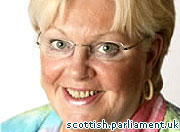Legalising assisted suicide in Scotland would result in a far greater number of people ending their lives than previously claimed, an MSP has warned.
Earlier this week Michael Matheson warned Margo MacDonald MSP, the architect of the End of Life Assistance (Scotland) Bill, that her “legislation is much closer in parallel to Dutch legislation.
He told her that “using the very same methodology that you’ve used to calculate the figures, the number of people who may exercise their rights under this legislation, if enacted, is closer to 1,000 rather than 55. That’s significantly different.”
Warning
Mr Matheson, a Nationalist committee member, made the stark warning as a Holyrood committee met to continue scrutinising the contentious Bill.
Mrs MacDonald has previously claimed, based on the experience of the US state of Oregon, that her legislation would result in around 55 assisted suicides per year.
And she rejected Mr Matheson’s warning, pointing to recent improvements in palliative care, which helps ease the suffering of the terminally ill.
Euthanasia
The Bill would allow the terminally ill to seek assistance in ending their lives, and it would also effectively legalise euthanasia by allowing doctors to administer drugs to terminally ill patients who were incapable of taking them.
But speaking to the committee Mrs MacDonald attempted to dismiss concerns and blur the line between assisted suicide and euthanasia.
She said: “I believe that there is no difference between sitting beside someone as they self-inject or ingest and pressing the plunger.
Vulnerable
“I think there’s no difference because you will have assisted them to bring their life to an end.”
Labour MSP Catherine Peattie expressed concern that vulnerable Scots could be coerced into ending their lives by unscrupulous family members.
And Helen Eadie, a Labour MSP, warned that assisted suicide could not be carried out under the existing NHS legislation.
Illegal
Mrs MacDonald replied that she intends to bring forward an amendment to the appropriate legislation which would mean that the Bill would apply to the NHS.
Assisted suicide is currently illegal in Scotland and anyone involved in assisting suicide may be charged with culpable homicide.
Danger
In September Mrs MacDonald indicated that she was willing to drop a proposal from the Bill which would allow disabled people to seek assistance in ending their lives.
The Bill has been plagued by controversy since it was launched.
Last month Dr Tony Calland, Chair of the BMA’s Medical Ethics Committee, warned of the danger posed by the Bill.
Creep
He cautioned: “Once you’ve crossed the rubicon of changing the law to allow premeditated hastening of the death of another person, you can never go back.”
Dr Calland also said that if legislation allowing assisted suicide was passed it would inevitably “creep” into other areas.
In July a leading doctor warned that legalising assisted suicide would betray “Scottish values” for the benefit of a vocal few.
Care
Dr Rosemary Barrett, Director of the Scottish Council on Human Bioethics, said: “The Bill is designed for people who believe their existence is ‘intolerable’.
“However, the truth is that Scotland offers excellent care for people suffering from extraordinary pain.
“Our palliative care services are capable of more than adequately managing physical pain. With such advanced medical services available, no person needs to experience ‘intolerable’ pain.”
Attacked
And in April, 16 palliative care specialists attacked the Bill in an open letter to The Times newspaper.
In the letter the medics warned that the Bill “sends a message to all disabled people and terminally ill patients that somehow because they are dependent on others they are of less value to our society and so may feel that they ought to choose to bring forward the time of their death.”


